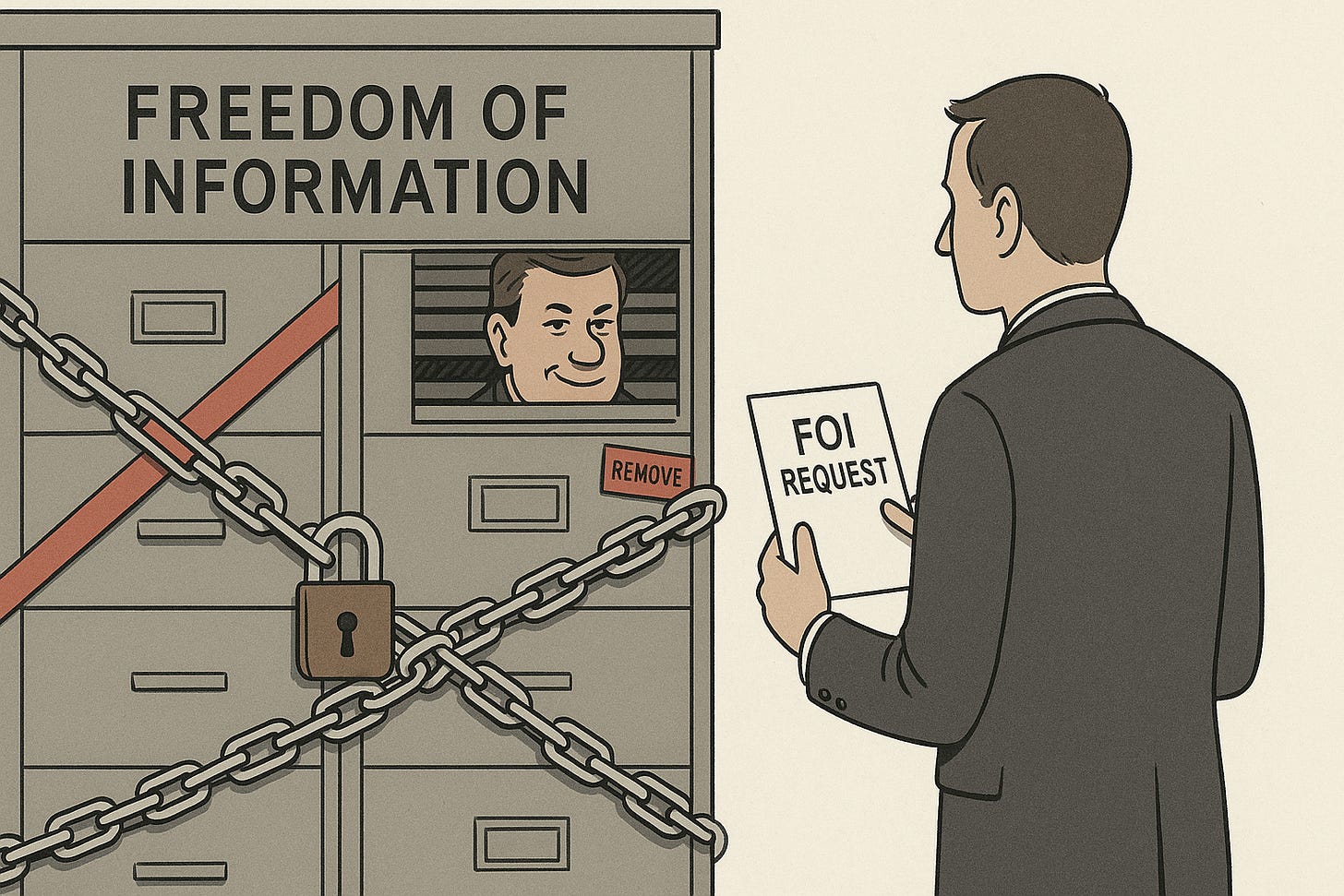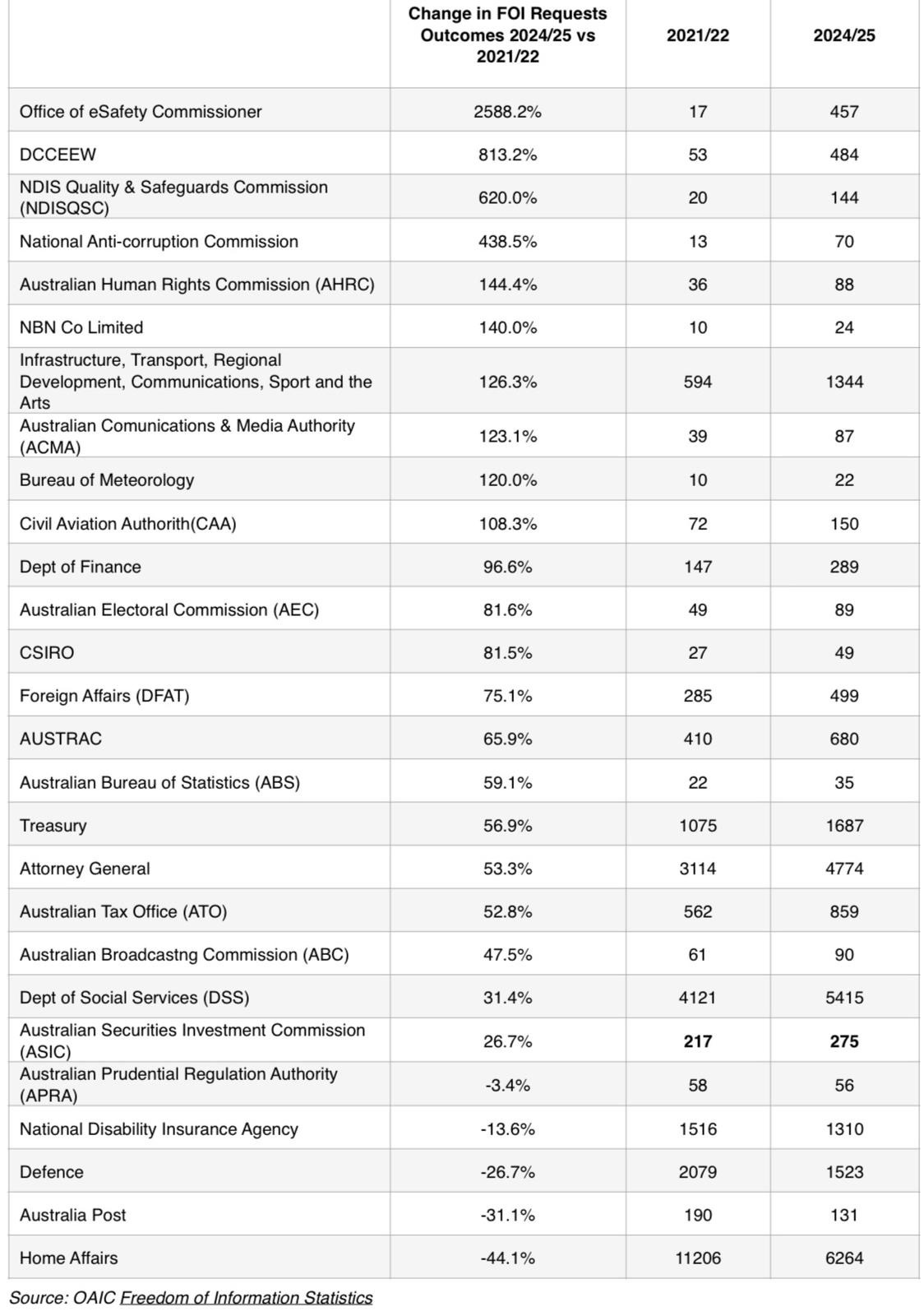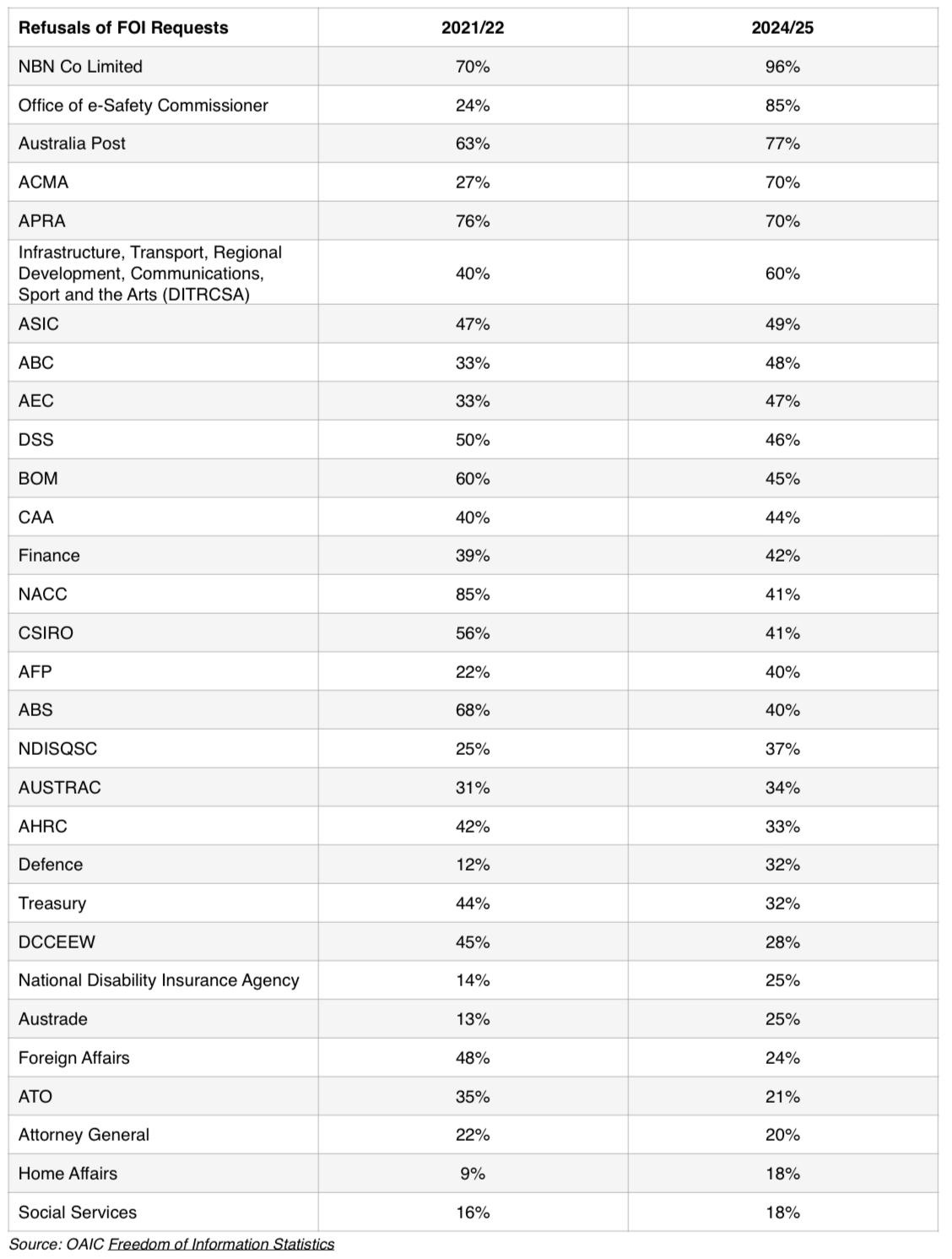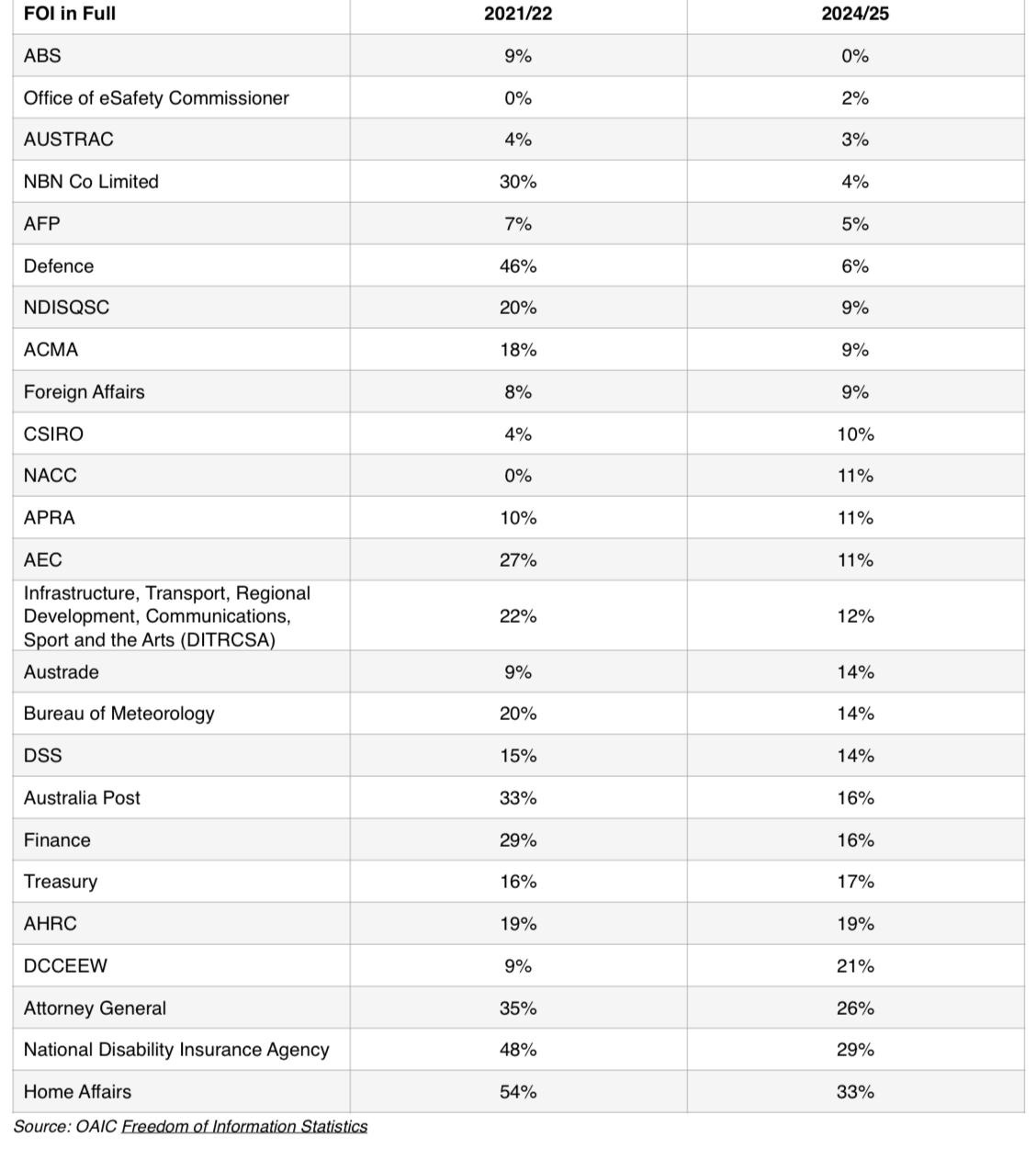“You do have to fight to keep freedom… because there are always people who will say, ‘Oh, let’s give a little bit more power to government, and a little bit more,’ and then one day you have so many people employed by government that they have a vested interest in keeping more and more power in the hands of government and less in the hands of the people… No, it shall not be… the government is there to serve the liberties of the people, not to restrict them.”
— Baroness Margaret Thatcher
Sunlight Is The Best Disinfectant
‘Public Disservice’ highlighted that Australia has the most bloated bureaucracy in the world, with 2.52 million public servants costing taxpayers more than $232 billion a year.
Unfortunately, our political and public-sector classes appear increasingly concerned that too much freedom of information (FOI) may not be such a good thing — particularly if a pattern of questionable behaviour might eventually expose something that could derail this lucrative gravy train.
Under the guise of making the FOI system more efficient and of “saving the taxpayer money” — an oxymoron if ever there was one — a proposed overhaul would effectively create new loopholes for bureaucrats to slip through, allowing them to withhold information and remain unaccountable to the very people who fund their generous remuneration.
From the bureaucrats’ perspective, what’s not to like about a system that increases rewards while reducing risk?
Since Prime Minister Albanese took office, there has been a 27 per cent increase in FOI requests — from 34,236 to 43,456 — pointing to rising public distrust. That trend represents an existential threat to the status quo.
Already the Worst Ever
Research by the Centre for Public Integrity (CPI) revealed that the Albanese government’s compliance rate for returning Senate-ordered documents has slumped to 32.8 per cent, down from 92.5 per cent under the Keating government. The standard excuse is that documents are cabinet-in-confidence and therefore cannot be disclosed.
According to the Office of the Australian Information Commissioner (OAIC), only 21 per cent of FOI requests were granted in full in 2024-25 — down from 59 per cent in 2011-12. Flat-out refusals have more than doubled from 12 per cent to 25 per cent over the same period.
Processing times at the OAIC have also blown out from six months a decade ago to more than 15 months today, and CPI notes that almost half of initial FOI decisions are found to be flawed on internal review.
Of particular note, FOI requests have exploded since the 2022 federal election in several key agencies:
Office of the eSafety Commissioner — up 2,588 per cent (from 17 to 457)
Department of Climate Change, Energy, the Environment and Water (DCCEEW) — up 813 per cent (from 53 to 484)
NDIS Quality & Safeguards Commission — up 620 per cent (from 20 to 144)
After the change of government, FOI requests by major department or agency are as follows, according to OAIC data:
Sharp increases in FOI requests are one thing, refusals to provide information by departments, commissions or agencies are another. OAIC reported the following trends:
Our Office of the eSafety Commissioner saw a dramatic jump in the number of refusals to 85 per cent of total FOI requests, after receiving a 26-fold increase in applications. For an office trying to convince the public it has our best interests at heart with respect to online safety, such opacity does not lend itself well to building trust, which is already suffering under multiple unsuccessful legal challenges.
In February 2025, eSafety Commissioner Julie Inman Grant was censured by Administrative Appeals Tribunal Justice Kyrou over her use of informal takedown orders — which involved less accountability than formal written removal notices requiring a statement of reasons. She was also forced to withdraw her Federal Court case against X Corp, where she demanded it take down videos of the Wakeley church stabbing across its global platform.
In energy, the 813 per cent jump in FOI requests made to DCCEEW over the last three years has seen a six-fold increase in the number of refusals to 136. The Bureau of Meteorology (BOM) and CSIRO have rejected 45 per cent and 41 per cent of FOI requests respectively in 2024/25, on the back of a 120 per cent and 82 per cent lift in FOI applications.
As an example, the Capacity Investment Scheme Agreements (CISA) under DCCEEW are shrouded in secrecy under the pretence of commercial-in-confidence to protect the interests of private investors. Proper transparency would undoubtedly highlight the lack of commercial bankability without heavy subsidies and reveal how much taxpayers are on the hook for over the long run. Furthermore, private interests willing to accept taxpayer funds should be required to disclose those sums.
Government climate bodies have made obfuscation an art form.
FOI requests were made to BOM to verify the data between traditional mercury thermometers and the new resistance probes, as the latter boosted temperatures by up to 0.7 degrees.
One such FOI request sought both sets of data over 15 years at Brisbane Airport. BOM said it was too onerous as it was handwritten. When the FOI rejection was taken to the OAIC, the response changed to no such data existing, before switching back to the original story and requesting large sums to collate it for only three years. There are 38 stations out of 700 with 20 years of parallel data which have not been released. Why?
Energy Minister Chris Bowen swears that the CSIRO is fiercely independent and the integrity of its research cannot be questioned.
When asked to supply its energy-generation modelling under FOI, the CSIRO refused on the grounds that such proprietary information could undermine the organisation’s intellectual property rights, putting it at a commercial disadvantage. While it is true CSIRO gets some funding outside government grants, it is still owned by the taxpayers. Or could it be that the model is so underwhelming that exposure to energy experts would be highly damaging to its reputation and future funding?
Our National Disability Insurance Scheme (NDIS) is a runaway freight train on cost, expected to grow from $49 billion this year to $63.4 billion by 2029. It has been a poster child for extortion by criminals, participant exploitation and misconduct. Why have 37 per cent of FOI requests been refused by its quality and safeguards arm?
Even our national broadcaster, the ABC — often accused of lacking independence and therefore in breach of its charter — rejected almost half of FOI requests in 2024/25. What has the ABC got to hide? The Sunderland Review, which confirmed the editing of additional gunshots into TV footage on the 7.30 Report, is a good example of why public scrutiny is required. While it found no evidence of intent to mislead or deceive viewers by any of the journalists, editors or producers, the sunlight exposed deep flaws in the organisation. Naturally, all senior editorial staff denied knowledge of the video tampering. The ABC may have publicly apologised for the egregious “error”, but once again it underlines the need for more FOI, not less.
Alternatively, we might ask how successfully granted-in-full FOI requests have been progressing as a percentage of all decisions, according to OAIC:
The data is discouraging. The ABS supplied zero granted-in-full FOI requests in 2024/25. Despite regularly publishing random statistics on social media, why did it recently seek to get journalists and economists to cease and desist from publishing immigration statistics on the basis that they could mislead the debate? Despite the six- to nine-month delay in reporting, economist Leith van Onselen accused the ABS of running cover for the government by politicising its reporting and undermining transparency. The ABS has a responsibility to report statistics, not to cast political positions on how data is interpreted.
Why is the National Broadband Network (NBN) providing only 4 per cent of FOI requests in full in 2024/25? Independent audits have revealed poor contract management and a lack of competitive tendering for critical infrastructure. The $29.5 billion program is projected to cost taxpayers north of $100 billion for an inferior technology, where 40 per cent of premises can never achieve advertised speeds due to copper-line degradation.
It begs a broader question: if government departments and agencies were successful in their missions, by deduction, wouldn’t fewer FOI requests be made? Superior results would place less pressure on our budgets and forward estimates.
How will they achieve reform of the FOI Bill?
Given that would be a non-starter, updated legislation will mean anonymous FOI requests will no longer be allowed, potentially placing vulnerable groups wishing to use third-party applications or whistleblowers at a disadvantage.
A 40-hour cap will be placed on each request. In this way, large FOI searches can be refused on time consumption alone. Just how that time is spent by departments that rarely complete anything on time or within budget speaks for itself. This is tactical obfuscation.
Departments will also be given new powers enabling them to reject vexatious requests. If government is imposing fees for FOI requests, external parties should be able to search for whatever is put on record. After all, if bureaucrats have nothing to hide, there is nothing to fear.
Tighter rules will be placed around cabinet document access. Naturally, this will be the easiest of cop-outs for government and its agencies. The position of senior bureaucrats is totally understandable. Public servants hate scrutiny. Using their mastery of deflection and government-speak, they escape accountability.
Budget and Senate Estimates
To understand why the government is so eager to push a tightening of FOI regulations, one need only look at the underwhelming performances of key bureaucrats during Senate (federal) or Budget (state) Estimates.
This is when departmental secretaries and commissioners front opposition upper-house members in an attempt to be held accountable for their portfolios. The bureaucrats tend to answer a bulk of basic questions with the response, “I will have to take that on notice,” in order to deflect and avoid embarrassment on live-streamed TV. Importantly, it is more convenient to take this line because submissions can be written and lodged after the proceedings, where the sting of being caught red-faced is ameliorated.
It is an important distinction to make.
If a corporate chief executive officer (CEO) responded to shareholders and financial analysts in that manner, they would be calling for his or her removal or resignation immediately. CEOs might ask the chief financial officer (CFO) to give more colour on particular matters for better context, but shareholders will not be left wondering — regardless of whether they are pleased with the answer. With over a quarter-century listening to thousands of earnings calls, never once was a question taken on notice.
What irony that the government is trying to introduce tougher FOI legislation to protect itself from the very truth it has so much trouble dealing with.
In this case, less isn’t more.








In addition to the unwillingness of the Government to provide information in FOI applications, by far the leading agents of misinformation and disinformation are the Government agencies and all the other bodies that propagate climate alarmism and the net zero suicide mission.
Australian governments have formulated energy policies without using information on wind droughts and the cost of storage.
The public has not been told about wind droughts, storage problems and the full cost of the net zero program, including deindustrialising the nation, vandalising forests and farmlands, and dividing rural communities.
https://rafechampion.substack.com/p/misinformation-and-disinformation
When governments are spruiking big projects (anything Net Zero or road/rail here in Victoria) you can back it in that governments will skulk behind cabinet- and/or commercial-in-confidence. How many citizens would not love to have a look at the true figures for Snowy 2.0, the SRL or the junked EWL, for starters?